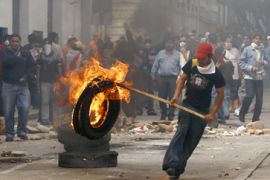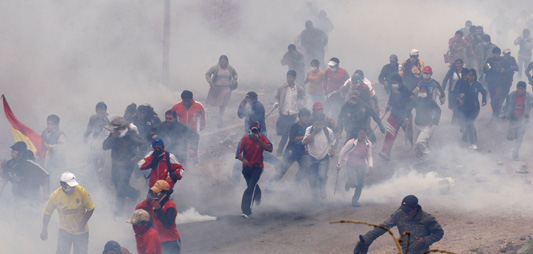Violent protests persist in Bolivia
Police clash with protesters demanding the “full capital” is moved to city of Sucre.

 |
| Protesters want the “full capital” moved to Sucre from La Paz [Reuters] |
Bolivian police have fired rubber bullets and tear gas on protesters in the city of Sucre for a second day to disperse a demonstration outside an assembly charged with rewriting the constitution.
Protesters are demanding the full relocation of the country’s government to Sucre in the south of the country from La Paz.
They want Sucre to become Bolivia’s “full capital,” with congress and government offices moved from the administrative capital, La Paz, a stronghold of support for Evo Morales, the president.
Sucre is nominally the South American country’s capital, but it is home only to the top courts, while the legislature and the seat of government are in La Paz.
Protests over the capital began in August, forcing the assembly, which sits in Sucre, to suspend debates for three months.
Although there were no immediate reports of the number of people hurt during Saturday’s clashes, similar protests a day before left about 100 people injured, the state news agency ABI reported.
The protests came amid a power struggle between Morales and his conservative rivals, who want more autonomy for the regions they govern and who also support the capital switch.
‘Civil disobedience’
Delegates have been meeting since Friday under heavy military guard in an army compound, vowing to speed up deliberations to produce a new constitution before their mandate expires on December 14.
Delegates taking part in assembly sessions are mainly from Morales’ Movement Toward Socialism party (MAS) as most opposition representatives decided to boycott the debates.
“To write a new constitution with 140 delegates that are mostly from MAS is not what I’d call a social pact, and even less if it’s done in an [army] base, among shotguns and rifles,” Jorge Quiroga, an opposition leader, was quoted as saying by the La Razon newspaper.
The opposition renewed its call for “civil disobedience” on Saturday in the eastern regions they govern, where anti-government sentiment is strong, and vowed to disregard the new constitution.
Morales supporters have staged huge protests in recent months opposing calls for the capital’s relocation, and thousands of them traveled to Sucre this week pledging to “defend” the assembly.
During the campaign that brought him to office nearly two years ago, Morales said the assembly would serve to cast a mold for a new state in which the country’s indigenous majority would have a greater say.
Critics say Morales, Bolivia’s first Indian president, is governing only for his Quechua and Aymara power base in the west of the country, ignoring the needs of the middle class in urban areas like Sucre and other relatively prosperous cities in the east.